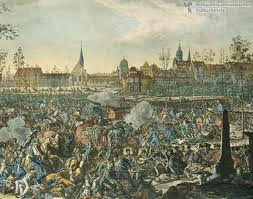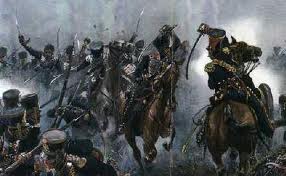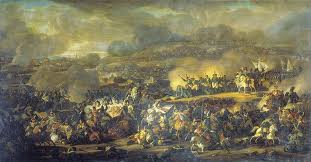 I’ve just completed a brief segment for a television programme on the Battle of Leipzig…and I’ll be frank, I think I sounded a complete numpty. So I thought I’d jot down a few bits of what I should have said and would have said if I’d had my wits about me, rather than…er…whatever it was I did say.
I’ve just completed a brief segment for a television programme on the Battle of Leipzig…and I’ll be frank, I think I sounded a complete numpty. So I thought I’d jot down a few bits of what I should have said and would have said if I’d had my wits about me, rather than…er…whatever it was I did say.
So let me begin by saying that the Battle of Leipzig, or the Battle of the Nations as it’s often called, was the game-changer of the Napoleonic wars, and Napoleon’s loss there opened the door for the invasion of France in early 1814 and eventually his abdication in April of that year.
So what happened to turn the Emperor of France and the Victor of Europe into the world’s biggest loser. Well, let me put it to you this way, a lot of things just went hideously wrong on the day. And when I say hideous, I mean inconceivably hideous.
 For a start, there was the French army itself. You may recall that when he lost those 450,000 men in Russia the previous year, well, when he’d got back to Paris on the 18 December, on the 19th at a levee, he’d announced that by spring he would need a new Grande Armee of 350,000 troops. I can only guess at the boggling that went on behind his back.
For a start, there was the French army itself. You may recall that when he lost those 450,000 men in Russia the previous year, well, when he’d got back to Paris on the 18 December, on the 19th at a levee, he’d announced that by spring he would need a new Grande Armee of 350,000 troops. I can only guess at the boggling that went on behind his back.
The authorities did their best, but by October of 1813, the Nouveau Grande Armee was still an army comprised of raw recruits. The seasoned veterans which had been the glue holding the whole together for over a decade were all gone–dead in the snows of Russia. So too were thousands of the officers. As for the French cavalry–they’d been pretty much wiped out by the Russian campaign, and they couldn’t be put back together again–France simply didn’t have the horses. At all.
Another thing had happened in the meantime too, and that was, the three main armies of the Allied forces–the Russians, Prussians, and Austrians–had all instituted sweeping reforms to their military structures so that the combined armies of the Allies were not the same badly led badly trained troops that Napoleon had faced and walloped previously.
Moreover all of the Allied forces were now driven by a patriotic fervour to rid Europe of the enslaving French…
 Let me quote for you the order of the day which was read out to the troops from the Allied command on the morning of the 16th: “Brave soldiers! The most important epoch of this holy war is at hand. The decisive hour is striking. Prepare yourselves for battle! The bond which unites mighty nations in one great enterprise will be drawn closer and tighter on the battlefield. Russians! Prussians! Austrians! You fight for a cause! You fight for the independence of Europe, for the freedom of your sons, for the immortality of your name! All for one! One for all! Victory is yours!”
Let me quote for you the order of the day which was read out to the troops from the Allied command on the morning of the 16th: “Brave soldiers! The most important epoch of this holy war is at hand. The decisive hour is striking. Prepare yourselves for battle! The bond which unites mighty nations in one great enterprise will be drawn closer and tighter on the battlefield. Russians! Prussians! Austrians! You fight for a cause! You fight for the independence of Europe, for the freedom of your sons, for the immortality of your name! All for one! One for all! Victory is yours!”
On that first day of the battle, things were pretty evenly matched. There were mistakes of course, and the fighting was fierce.
The Allied forces surrounded Leipzig from the north, south and east, but the west remained open and Napoleon, at the end of the day, had he had his wits about him, could have forseen that they’d fought each other to a draw and the wise move would have been to sue for peace and an orderly withdrawal…
But that’s what he didn’t do. Because Napoleon was at heart an obsessive gambler and he was convinced as he always was that just one more throw of the dice at double or nothing stakes would deliver the victory he craved.
 On the 17th, there were minor skirmishes, but both sides were resting their troops. But then on the 18th, all of those many mistakes caught up with the Emperor. The weather was appalling and mired his troops in mud as they attempted to manoeuvre into place. Due to his lack of cavalry and thus reconaissance, he didn’t have accurate reports on the Allied dispositions or troop numbers. Overnight, large reinforcements had arrived in the Allied camp, so that he and his 160,000 troops now faced an Allied army of 300,000 troops. He was running low on supplies and ammunition.
On the 17th, there were minor skirmishes, but both sides were resting their troops. But then on the 18th, all of those many mistakes caught up with the Emperor. The weather was appalling and mired his troops in mud as they attempted to manoeuvre into place. Due to his lack of cavalry and thus reconaissance, he didn’t have accurate reports on the Allied dispositions or troop numbers. Overnight, large reinforcements had arrived in the Allied camp, so that he and his 160,000 troops now faced an Allied army of 300,000 troops. He was running low on supplies and ammunition.
All during the 18th, both sides fought like tigers. By the late evening, it was clear that the Allies had won the day. The Allies had over 60,000 casualties; French losses were in the region of 40,000…and by 2 a.m., Napoleon had given the order for retreat.
The battered French troops began streaming out of Leipzig over the western bridge even as the Allied troops rallied and threw themselves once more into the breach with a ferocity which stunned the French. The narrow streets and lanes of Leipzig were crammed and locked with the wagonloads of wounded, guns, and soldiers…
Then, an even greater catastrophe occurred. The chappie who’d been ordered to blow up the bridge after the French had fled the city got his timing or his charge wrong and blew the bridge while there were men on it and while many French were now trapped within the city walls.
Again, let me give you an eye-witness report, this from the French Marechal Macdonald: “Our unhappy troops were crowded together on the river bank, whole platoons plunged into the water and were carried away; cries of despair rose from all sides. The men perceived me. Despite the noise and the tumult, I distinctly heard these words: ‘Monsieur le Marechal, save your men!’ I could do nothing for them! Overcome by rage, indignation, fury, I wept!”
 The French retreat was the antithesis of orderly; it was chaos–with many abandoning their field guns, deserting, and many more contracting typhus as they ran away. The Allied troops swept into the city of Leipzig and in so doing brought the number of French prisoners to over 30,000. To be honest, the French army never recovered.
The French retreat was the antithesis of orderly; it was chaos–with many abandoning their field guns, deserting, and many more contracting typhus as they ran away. The Allied troops swept into the city of Leipzig and in so doing brought the number of French prisoners to over 30,000. To be honest, the French army never recovered.
Meanwhile, those French prisoners of war fell victim to their own folly–before the battle, in fits of rage and destruction, they had pillaged widely, throwing on the fire whatever they could not consume. Indeed, they ripped up hundreds of fruit trees from beyond the city walls and fed these to the fires as well. Thus, as prisoners of war, there was literally nothing to feed them and they starved to death, or survived by eating the flesh of the dead horses, or even, according to some eye-witnesses their fallen comrades.
Over 600,000 men had taken part in this four-day battle. But of the many losses, Napoleon’s were the worst, for he could not replace them–he’d already exhausted France of her young men for this New Grande Armee and there simply were no new recruits to be had.
Indeed, he had so impoverished France with his war-lust, that in the spring of 1814, when the Prussians–keen for revenge and lots of pillage–invaded France, their letters home tell of unspeakable poverty–they write that although they had meant to pillage and rob, there was nothing to take and the French peasants were so destitute, they made Prussian peasants look like wealthy burghers…
And finally, the Battle of the Nations taught the Allied leaders the one thing they’d always doubted: they could win; they could defeat the military genius of Napoleon–he’d never been beaten before, but now victory could be theirs!
And it was…
(And it would take poor France another 75 years to recover…)